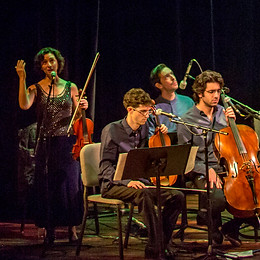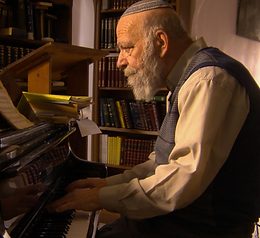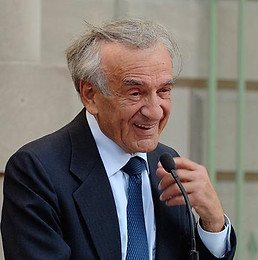

Quill of the Soul
Hasidic Nigguns meet other world incantations

"The tongue is the pen of the heart, but melody is the quill of the soul."
Rabbi Shneor Zalman,
founder of Habad

a musical tribute to
Elie Wiesel
ABOUT
Elie Wiesel, the Nobel Prize winning writer, educator and Holocaust scholar, was not commonly known for his passion for music. This changed when in December 2010, Wiesel decided to share memories and melodies that helped shape his soul, at a special concert at the 92nd Street Y in New York, directed by Mati Lazar.

Inspired by "Melodies and Memories of my Childhood," “Quill of the Soul,” was an evening of music in tribute to Wiesel, mounted on Sunday, November 1, 2015, at Boston University’s Tsai Auditorium.


Presented by the Elie Wiesel Center, produced by the Boston Jewish Music Festival, and hosted by WGBH, this unique performance takes the melodies from Wiesel’s childhood as its point of departure, and proceeds to explore the surprising parallels between nigguns (Hasidic Jewish sacred songs) and other ethnic chants—juxtaposing melodies sung by Wiesel with Persian, Indian, and Yemenite music.
The culmination of a two-week residency and workshop, the concert featured a dynamic multi-cultural ensemble of international musicians and singers performing alongside Boston University students and faculty.


“My grandfather was a marvelous singer, with a warm, melodious voice that could conjure world near and far. When he stopped singing to catch his breath, I would beg him for more, and with an ever more gleeful smile he would recall a new song. Once he stopped in the middle of a niggun. Eyes closed, he seemed asleep. Afraid of waking him, I didn’t budge. But he wasn’t sleeping. “I’m dreaming,”: he said. “I’ve never sung so much. Thanks to you, I can rise to Heikhal Haneggina, the celestial sanctuary where words become song.”
Elie Wiesel,
All Rivers Run to the Sea

Tzama Lekha Nafshi (Hasidic, Hebrew)
Solo: Parham Haghighi (Iran)
Deepti Navaratna (India)
Boston University Students

THE PROCESS
Quill of the Soul was conceived as a two-week immersive forray into the world of Nigguns branching into other ethnic traditions, and ultimately culminated in a large performance by students and visiting musicians at BU.


The closing event in Matti Kovler's Floating Tower Series at BU, the design and content of this project are a continuation of the methodology developed by Kovler's mentor, composer Andre Hajdu and his innovative work with the Israeli Ha'Oman Hai Ensemble
Hajdu may be a name less familiar to American audiences. A pupil of Zoltan Kodaly and Olivier Messiaen, he is considered to be the Bela Bartok of Hasidic Music.
Born in Europe three years apart — both Hajdu and Wiesel were members of the same generation. Wiesel collected, adapted and taught Hasidic tales, while Hajdu collected, adapted and taught Niggunim — Hasidic melodies.



Wiesel, a mesmerizing storyteller, did not teach Hasidic tales as exclusively Jewish texts, but as literature with universal human concerns, with themes of memory, issues of moral choice.
Hajdu, in turn, integrated Jewish folklore from eastern Europe into a broader genre of contemporary art music. Through his experimental work with Ha’Oman Hai Ensemble, a small group of students of which Kovler was a member, Hajdu encouraged a stylistic diversity which allowed for Sephardic musical inspirations to co-exist alongside Gershwin or Bartok style arrangements.


Through their unique lyrical voices, each in their own way, both Wiesel and Hajdu have drawn on the flavor of Jewish tradition to communicate the universality of Jewish stories and music.
Quilll of the Soul Rehearsals
Yonatan Niv from the Ha'Oman Hai Ensemble (Israel) at a workshop with Boston University Students and visiting Iranian musicians: creating an arrangement that brings together a Persian song with text by Rumi, and a Maghrebi Jewish Piyut

“The uniqueness of our method is that every one shares in the shaping of the music, every one acts as musician, singer and arranger. A large part is set aside for improvisation, even though everything has been worked out painstakingly.
Andre Hajdu,
On his work with Ha'Oman Hai Ensemble


PARTICIPANTS

Hankus Netsky
clarinet, piano

Pouya Shabanpour
daf, dareye




Yair Harel
percussion
Nori Jacoby
viola
Yonatan Niv
cello



Farzin Denghan
kamanche
Hamed Tabkhi
tar, setar


Deepti Navaratna
voice

Eden McAdam Somer
violin / voice

Parham Haghighi
voice
Nash Tomey
double bass


Matthew Shifrin
voice/accordion

Matti Kovler
piano

Matinee Shaker
voice

Orlando Cela
flute

Trey Pratt
conductor

Christina Smith
voice
Renee Francis Piper
voice
Rachel Steinberg
voice
Magdelena Tang
voice



Jonathan Mott
voice
Benjamin Low
voice
Chad Putka
voice

“Legend has it that, Rebbe Uri of Strelisk, through his prayers, acquired such powers that he could obtain for his people anything they desired; therefore, each morning before services, he would make mental notes of the requests he was to present in heaven. However, as soon as he began to pray, his soul caught fire, and in his ecstasy he forgot what it was he had planned to ask"
Elie Wiesel,
From All Rivers Run to the Sea


PROGRAM
We invite you to join us for a journey in which the Hasidic nigguns emerge and disappear in the context of other melodies, words, styles.


It will be a journey where the initial niggun finds its comparatives — from peasant texts in Ukrainian to mystical poetry of Rumi in Persian, from Hasidic nigguns to Sanskrit incantations.

We invite you to forget the boundaries of geography and language, and immerse yourself in the celestial sanctuary where the soul's longing becomes song.
Quill of the Soul
Sunday, November 1, 2015
Tsai Auditorium, Boston University
Full Performance (75 minutes)
